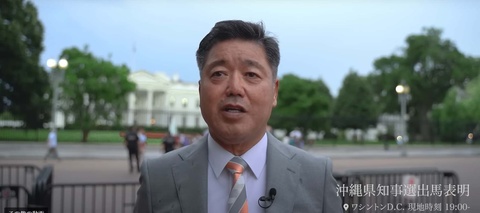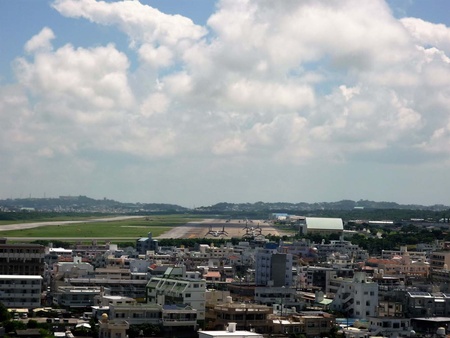
Announcing One’s Candidacy at the White House on a Whim?
Shimoji Mikio (from Okinawa, 60 years-old, previous member of the House of Representatives, former Postal Service Privatization & Disaster Management Minister) announced his candidacy for the Okinawa Prefectural Governor election on July 13 by traveling to Washington D.C. in the United States of America, and stating the following:
“The reason why I’m announcing my candidacy in front of the White House is: Okinawa’s post-war fate was decided by the White House.
Seventy-seven years ago, Okinawa was put under an American occupation, and 27 years later, Okinawa was returned to Japan.
Those decisions were all made at the White House. Soon it will mark 50 years since the return of Okinawa to Japan’s administration. The fact that 70% of US military bases are centralized in Okinawa, and the US government’s refusal to make any drastic changes to the U.S.–Japan Status of Forces Agreement, are results of impactful decisions made by the White House.
I, on this occasion, while announcing my candidacy for the Okinawa Prefecture Governor’s election, would like to emphasize my entering the race as an individual who will seriously work to resolve the US base issue. To show that, I have not announced my candidacy at a press conference, but at the place where Okinawa’s fate was decided: the White House.”
I felt a new possibility emerge while watching this video.
“Tokyo didn’t decide Okinawa’s path in history, Washington D.C. did. However much we negotiate with the Japanese government, we go nowhere.” His irritation probably resonated with many other nihilistic Okinawans.
Mr. Shimoji is known throughout the Brazilian Nikkei community as the founder of the Yonsei Nikkei visa system, and for visiting Brazil twice for informational meetings while he was a member of the House of Representatives. He leaves a strong impression as a politician invested in the Nikkei community.
The same Mr. Shimoji, after his White House video, even visited Hokkaido and Tokyo to speak and campaign publicly on the streets as follows: “Okinawa’s base problem is a problem for the whole of Japan.” While watching a video of him giving this speech, I thought that the position of Nikkei not living in Japan and the position of Okinawan residents is similar, so I contacted him to pick his brain regarding this impression.
After finding a suitable time in-between his busy campaigning schedule, we met online while he was in Uruma City. He remarked, “Even if I try to talk, you can’t hear me too well, right? That sound drowning me out is American military planes.” So, we made conversation with such an “ambience” around us.
Okinawan Residents Regard the Japanese Government with Distrust
It should go without mention, but Japanese citizens outside of Japan cannot vote in regional elections. Whatever we write for this foreign Japanese newspaper, it will have no effect on Okinawan voting trends.
And in the reverse, whatever Japanese politicians do for the Nikkei community does not lead to votes. Yet, Mr. Shimoji is considering the views of the Nikkei community. His consideration is not financially motivated and not for votes.

The greatest focal point in this Okinawan Governor Election is the Henoko Base transfer issue, but to Nikkei abroad, they hardly know why 70% of American military bases in Japan are concentrated in Okinawa, an area that only comprises 0.6% of Japan’s territory itself.
Research showed in the early 1950s, 90% of American military bases within Japan were outside of Okinawa, which means 10% were in Okinawa. Afterwards, lands used as those bases on mainland were gradually returned to Japanese administration, and American bases remained centered in Okinawa.
I ask Mr. Shimoji his perspective. He responded:
“Seventy-seven years ago, Japan was released from American occupation, but only Okinawa remained under America. One of the preconditions that America release Japan was that the US have their bases concentrated in Okinawa.
Often many people cite a ‘geographic advantage’ of Okinawa as a reason of the concentration of US bases in Okinawa, but that has nothing to do with this.
Seventy-seven years ago, nobody would imagine that China would become such a world power today. It was political intent. It was easier for the US military if they antaginize the people of Okinawa only, not all of Japan. Okinawa isn’t physically connected to the mainland. If the US military concentrates bases in this area, only 1,400,000 people will be incensed.
The biggest challenge for the Americans who would like to avoid Japanese opposition in the occupation process was the location of the military bases. When the Americans thought ‘where do we keep our bases,’ the White House’s decision was to concentrate them in one place.
In Okinawa, opposition was limited. Instead of making enemies all over Japan, they decided to make only 1.4 million enemies. That was the US political occupation strategy. During the 27 years that Okinawa was under American rule, all bases were transferred there. Then, the US returned Okinawa to Japan. Therefore, the base issue is a problem for all of Japan.
In 1952, Japan lost many rights after losing WWII when the Treaty of San Francisco came into effect. When it came time to restore those rights, Japan consented to giving up Okinawa to American occupation. The treaty was in effect as of April 28, 1952. Okinawans consider this date a day of disgrace.
On that occasion, the US-Japan Security Treaty was established, and Japan continued to acknowledge America’s reasoning for American bases to remain in Japan, and the U.S.-Japan Administrative Agreement (predecessor to the U.S.–Japan Status of Forces Agreement) was defined. Okinawa is suffering from that decision to this day.
At the time, US military training locations on the mainland were being heavily opposed, and the movement led to the North Fuji training campus in Yamanashi Prefecture being returned to Japan in 1958, among others. Due to such resistance, the burden of hosting US military bases and training camps fell to Okinawa. And Mr. Shimoji echoes this in the following statement:
“Only Okinawa has not yet been set free from the bounds of 27 years of US occupation. Regarding Futenma Air Base and the plan to transfer Henoko, just moving the base to where fewer people live in case there was ever an incident that could harm a great portion of the population, solves nothing, not without moving it outside Okinawa.
How Governors Onaga and Tamaki Denny handled this problem had issues as well. They took the nation to court, knowing that the nation would win. The decision made at court became the basis of evidence to continue filling in the bay for Henoko. Mr. Shimoji thinks we should use the will of the people, instead of court, as the basis to sway the White House directly.
Governor Onaga created a travel office of the Okinawan prefectural government in Washington D.C. and dedicated himself to negotiation, and Governor Tamaki made two official visits to the White House and had nothing to show for it. The prefecture shouldn’t be going to negotiate by itself; there should be some way to involve the populace of the USA at the bargaining table.
© 2022 Masayuki Fukasawa





